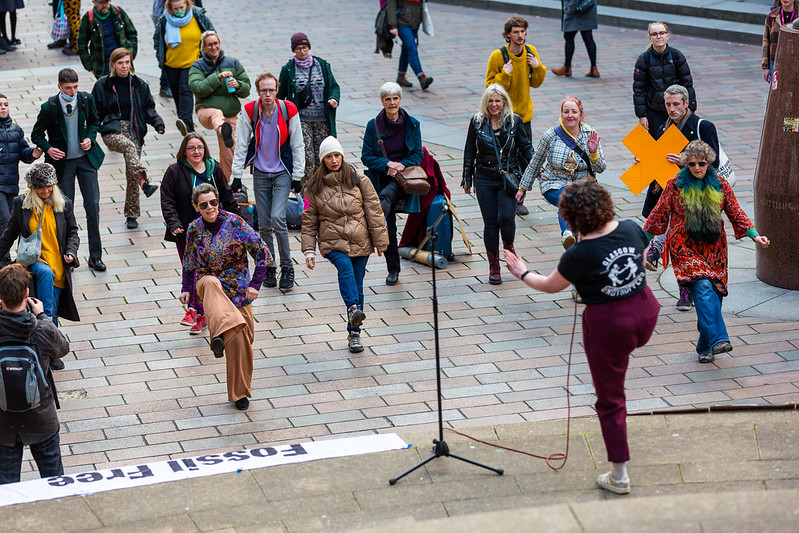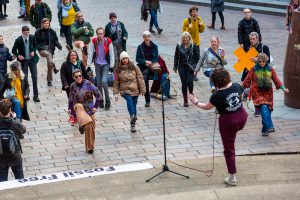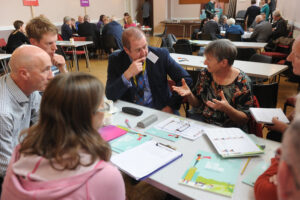
5 ways to take climate action after COP26
Have you been energised by COP26?
Were you one of the hundreds of thousands of people who took to the streets? Or did you see inspirational action on TV? Did you hear from people sharing their experiences from the frontlines of the crisis?
Whatever the reasoning, it is wonderful that you are thinking about taking these steps. Being involved in action can help you overcome the feeling of powerlessness that we can sometimes feel with a problem as big as climate change. It is also a great way to make connections with others and get involved in a community of people who care.
The good news is that there is a way for you to get involved – there is lots of work that needs to be done. You could have an eye for detail and help with research, a flair for creativity, be a big noise on social media or be keen to sit down with your local politicians.
The climate movement needs everyone – whatever your experience level or area of interest. There are loads of amazing people and organisations out there that you can lend your time and support to.
If you are new to action, you might find that lots of groups are probably taking a little break after the exertions of COP and the intense workload in recent months. So they might be slow to get back to you at first and only be planning activities for early next year.
Here are 5 ways you could get involved in climate action after COP26.
1. Find an issue or organisation you care about
What are the issues you care about and are interested in? Are you passionate about better public transport, protecting green space, or maybe you want to take on big polluters? Or do you want to focus your on activities in your local area?
Whatever you are into, there are loads of great local campaigns doing fantastic work across Scotland.
You could get involved with Get Glasgow Moving who are pressing for free, publicly owned buses for Glasgow, Aberdeen Climate Action who run events and engagement activities around climate in the North East or Divest Lothian who are working to get public money out of fossil fuel companies.
Actions Speak Louder Than Words are organising to reduce the harmful community and climate impacts of the Mossmorran petrochemical plant in Fife, Friends of the Earth Tayside are meeting regularly to discuss local issues whilst Friends of the Earth Falkirk are exposing what it is like to live in the shadow of Grangemouth.
You can find out about these groups and others on our People Power Network map

2. Join the Stop Cambo campaign
The fight to stop the huge new Cambo oil field off the coast of Shetland is an iconic climate battle. Since the campaign launched just a few months ago over 90,000 people have objected to the project alongside organisations, scientists and politicians of all kinds.
During COP26, the campaign organised projections on buildings, a theatrical performance of “the Queen” turning off the oil pipeline, wrote messages for the UK Government on oil barrels and pressed politicians at every turn about their support for Cambo.
The coming months are likely to be really busy as we ramp up the pressure on the UK Government to reject this dangerous proposal. To help this, you can email your MP now or join a mobilisation group by visiting the Stop Cambo website

3. Start your own group or revitalise an existing group
Is there a climate-related issue you care about but there isn’t anyone working on it? Or are you part of a group that’s a little underpowered at the moment? This can sometimes happen with different demands on people’s time and priorities changing.
We’ve created a great selection of resources that will help you build a group and get organised for action. They include info on creating a welcoming space and organising meetings, using the media to your advantage and talking to decision makers to help make your demands.
These tools and tips can be found as part of our People Power Network hub
4. Tell someone how you feel about climate change: politicians, family or followers
Climate change is an enormous issue, maybe the biggest issue. But we tend not to talk about it with our friends and family. By discussing it with others, we can share our thoughts, our fears, the things we might want to do in response. You might find that others feel similarly or want to take action but aren’t quite sure where to start.
Some people find this type of sharing easier on social media. You can share things in your voice, or you can share other people’s stories that resonated with you. These can spark new conversations and create new links that you maybe didn’t know existed.
Politicians care what the voters care about. If you want more action on climate change, then write to your local representative to tell them so. You don’t have to have a fully costed plan to solve climate change so don’t feel worried that you aren’t an expert on an issue. Tell them why it matters to you and what you want them to do about it. We have a guide to talking to your MSPs here

Photo: Maverick Photo Agency / SCCS
5. Support the work of climate campaign groups
You might not be ready or have the time to start campaigning just yet, but you can support others who are. There are lots of great groups out there pressing for the action we need to cut climate pollution and improve lives. But we’re a bit biased and think you should support our work.
By making a regular donation to Friends of the Earth Scotland you can enable us to plan for the future and continue our vital campaigning work.
Whilst COP26 didn’t deliver what was needed, we left Glasgow with real hope in our hearts. Those two weeks of unprecedented action and huge climate marches showed that people are rising up to demand climate justice in greater strength and unity than ever before.
With your support and energy we can keep up this momentum and keep building this beautiful and powerful movement to create the better world we know is possible.
